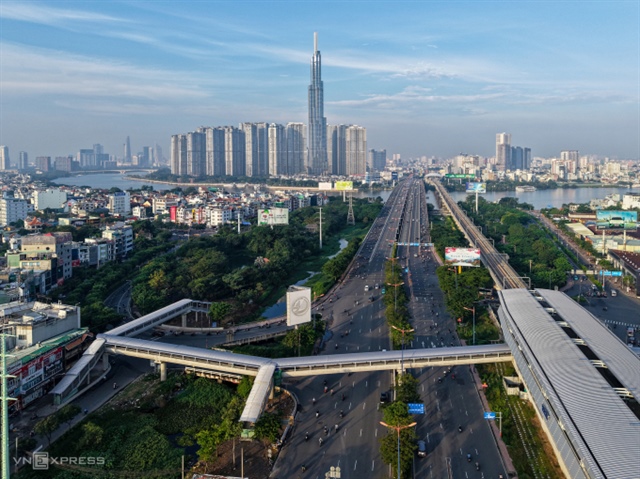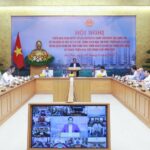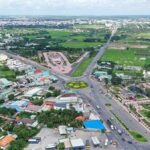A proposal by Dr. Tran Du Lich, Chairman of the Advisory Council for implementing HCMC’s Resolution 98, was discussed at a seminar on mobilizing state-owned enterprise resources for the city’s development on June 3rd.
According to Dr. Lich, the upcoming reorganization and privatization of state-owned enterprises in the city should align with new policies, such as Resolution 68 on the private sector and the merger of HCMC with Binh Duong and Ba Ria-Vung Tau provinces.
To that end, the city should focus its resources on forming five state-owned corporations and conglomerates in key areas that underpin the development of the private sector and serve the welfare of its citizens.
Specifically, the five proposed corporations include a financial investment corporation, modeled after the existing Ho Chi Minh City Financial Investment Company (HFIC), which would serve as the financial arm of the state; and an urban infrastructure development corporation focused on social housing, similar to Singapore’s HDB.
To drive the implementation of Resolution 57 on science and technology, HCMC needs a high-tech and digital infrastructure development corporation. Meanwhile, a metropolitan railway system management corporation will be responsible for developing 355 km of metro lines over the next decade and connecting with Binh Duong and Ba Ria-Vung Tau provinces.
Additionally, the public utility companies could be consolidated and socialized in the long term. “The five corporations overseeing these five sectors will create strength and serve as a tool for market development and citizen welfare,” said Dr. Lich.

Metro Line 1 along Vo Nguyen Giap Street in Thu Duc City, looking towards Binh Thanh District, HCMC. Photo: Thanh Tung |
Meanwhile, Professor Dr. Nguyen Trong Hoai from the University of Economics in HCMC suggested that these state-owned corporations and conglomerates should be managed according to private sector models and international best practices.
Mr. Nguyen Quang Thanh, Deputy General Director of HFIC, emphasized that successful management is crucial, as the current model burdens business leaders with time-consuming procedures, causing them to miss out on business opportunities.
Additionally, Dr. Tran Ngoc Anh, a member of the National Advisory Council for Resolution 57 and a professor at Indiana University in Bloomington, USA, highlighted the importance of a transparent and comprehensive performance evaluation system for state-owned enterprises, including financial and non-financial KPIs, based on international experiences.
For instance, the China National Petroleum Corporation (CNPC) implemented a comprehensive performance evaluation system in the 2000s, incorporating safety and environmental targets alongside business indicators, with direct links to the compensation of its leaders.
Currently, HCMC has 46 state-owned enterprises, including 22 public utility companies. Last month, the Chairman of the HCMC People’s Committee, Mr. Nguyen Van Dang, instructed the Department of Finance and the Ho Chi Minh City Institute for Development Studies (HIDS) to develop a plan for reorganizing state-owned enterprises into conglomerates, to be submitted to the relevant authorities by October.
At the seminar, Dr. Tran Anh Tuan, Chairman of the Members’ Council of Tan Thuan Industrial Promotion Company, agreed that state-owned enterprises should take on areas where the market economy falls short (in terms of public utilities and welfare) and large-scale infrastructure projects that require significant resources and long-term capital recovery, which are challenging for private enterprises.
“State-owned enterprises can focus on digitalization, infrastructure, and national defense. By selling shares in other enterprises, they can reinvest in these critical areas,” said Dr. Tuan. He added that investing in infrastructure, such as transportation and digital technology, would boost the private sector and attract FDI.
Mr. Tran Huu Dung, Director of Quang Trung Software Park (QTSC), emphasized the need for a state-owned corporation in the digital transformation sector to effectively manage data. However, he also suggested implementing a mechanism to share data with external parties, recognizing data as a new resource.
HCMC plans to privatize its top ten enterprises, which account for nearly 50% of the total chartered capital of the 46 state-owned enterprises. The goal is to complete the enterprise valuation process this year.
However, the city administration may need to wait for a comprehensive legal framework due to changing regulations and administrative boundary adjustments. This delay will impact the privatization decisions and the resolution of financial and joint venture-related issues for state-owned enterprises.
Dr. Tran Anh Tuan suggested that the city should consider forming conglomerates before proceeding with privatization in the 2026-2030 period. Additionally, he proposed merging enterprises from HCMC, Binh Duong, and Ba Ria-Vung Tau into specialized conglomerate models, followed by privatization.
To proactively address potential challenges, Mr. Pham Binh An recommended that HCMC take the initiative in proposing solutions to the central government. Dr. Tran Du Lich concurred, suggesting the development of a proposal to the central government for a mechanism to reorganize and renew the group of state-owned enterprises in line with the resolutions of the competent authorities.
Vien Thong
“Streamlining the Social Housing Process: Cutting Down the Wait by at Least 350 Days”
“On Monday, June 2nd, Prime Minister Pham Minh Chinh chaired a conference to deploy Resolution 201/2025/QH15 of the National Assembly on piloting several special mechanisms and policies for the development of social housing. The resolution also entails a review of the social housing development situation in the first five months of 2025 and sets the plan for the remaining months of the year. The conference was held via teleconference, connecting the Government Office with the People’s Committees of provinces and centrally-run cities.”
Building a 140km-plus Expressway Linking Binh Thuan, Lam Dong, and Dak Nong
The proposed investment in a highway connecting the three provinces of Binh Thuan, Lam Dong, and Dak Nong is an ambitious project. With an approximate length of 140.6 km, this highway will be a significant infrastructure development in the region. The route is designed to traverse through breathtaking landscapes, connecting communities and fostering economic growth. The Binh Thuan province will boast a 43.9-km stretch of this highway, while Lam Dong and Dak Nong will be graced with 61.9 km and 34.8 km of this road, respectively. This highway promises to be a game-changer for the region, offering a faster and more efficient transportation network.
Unlocking the Potential: Empowering State-Owned Enterprises for Efficient and Effective Operations.
“Vice Prime Minister Ho Duc Phoc signs Government Directive No. 77/CD-TTg. This directive, dated May 29, 2025, outlines strategic initiatives to boost state-owned enterprises’ (SOEs) productive business operations. The measures aim to enhance efficiency and foster growth within these businesses.”





















